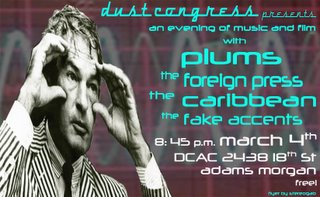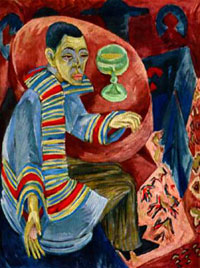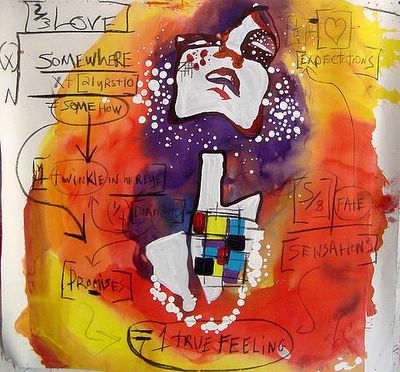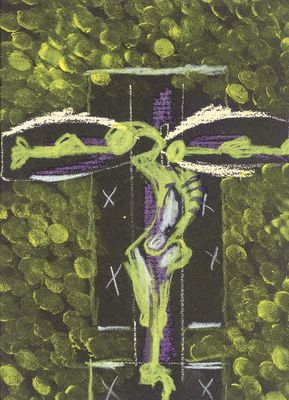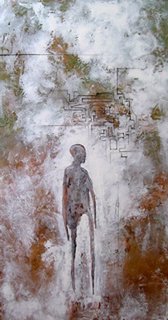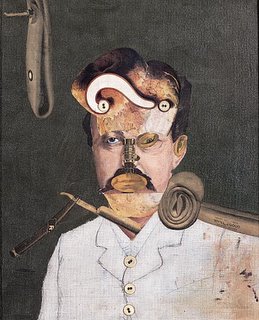
George Grosz, Remember Uncle August, the Unhappy Inventor, 1919
* From an interview of Ed Sanders of the Fugs, originally published May 12, 1967 in the Berkeley Barb [via an Arthur Magazine email] excerpt:
"Interviewer: I take it you're not as optimistic as Tuli [Kupferberg] seems to be about the possibility of radical socio-political change in America?
"Ed Sanders: My motto is 'Fuck God in the ass.' I don't have any faith at all in the efficacy of politics. I don't know what's going to happen. I'm political — I vote and hustle and hike, fight and scream. Non-violently. I don't know what to do. We just try. I assume that what people want is a transformation of the society, right? They want to set up a new type of government, a new type of methods for doing almost everything, from handling the A&P to handling the problems of war and peace — so how is it done? I read everything I can read, and I go to all the demonstrations, and nobody's even set up a cabinet - they ought to set up some sort of rebel cabinet and issue big decrees all the time about where it is they're pissed off. I don't know. The way to do it is really be militant, man,and get after them … the bastards.
"Ogar: What about loving your enemy to death?
"Sanders: Love is a strong force if used by a whole bunch of people. Love vibrations have to be simple. Love energy is like -- it melts rather than discriminates, and that's all right. But ..I don't see how you could disrupt the war machinery with love, because human beings are, like, abstracted from the war machine. That's the way they've developed it through electronics and computers. The further away an idea or an institution is from the human mind, the harder it is to dissolve it with love. It's like trying to make love to an electricity cable, because that's what it is, … it's all electricity on cards and memory units. If you don't have any love targets, you know, your love vectors can't grope in on somebody and try to transform them."
* Arundhati Roy on Bush's upcoming, 'bloodstained' visit to Ghandi's memorial concludes:
"Oh, and on March 2, Bush will be taken to visit Gandhi's memorial in Rajghat. He's by no means the only war criminal who has been invited by the Indian government to lay flowers at Rajghat. (Only recently we had the Burmese dictator General Than Shwe, no shrinking violet himself.) But when Bush places flowers on that famous slab of highly polished stone, millions of Indians will wince. It will be as though he has poured a pint of blood on the memory of Gandhi.
"We really would prefer that he didn't.
"It is not in our power to stop Bush's visit. It is in our power to protest it, and we will. The government, the police and the corporate press will do everything they can to minimize the extent of our outrage. Nothing the happy newspapers say can change the fact that all over India, from the biggest cities to the smallest villages, in public places and private homes, George W. Bush, the President of the United States of America, world nightmare incarnate, is just not welcome."
* Sudan man forced to marry a goat after being caught having sex with the animal. excerpt:
"'We have given him the goat, and as far as we know they are still together' Mr Alifi said.
"Mr Alifi, Hai Malakal in Upper Nile State, told the Juba Post newspaper that he heard a loud noise around midnight on 13 February and immediately rushed outside to find Mr. Tombe with his goat."
"'When I asked him: 'What are you doing there?', he fell off the back of the goat, so I captured and tied him up.'
"Mr Alifi then called elders to decide how to deal with the case.
"'They said I should not take him to the police, but rather let him pay a dowry for my goat because he used it as his wife,' Mr Alifi told the newspaper."
* If writers were good businessmen, they'd have too much sense to be writers." -- Irvin S. Cobb

